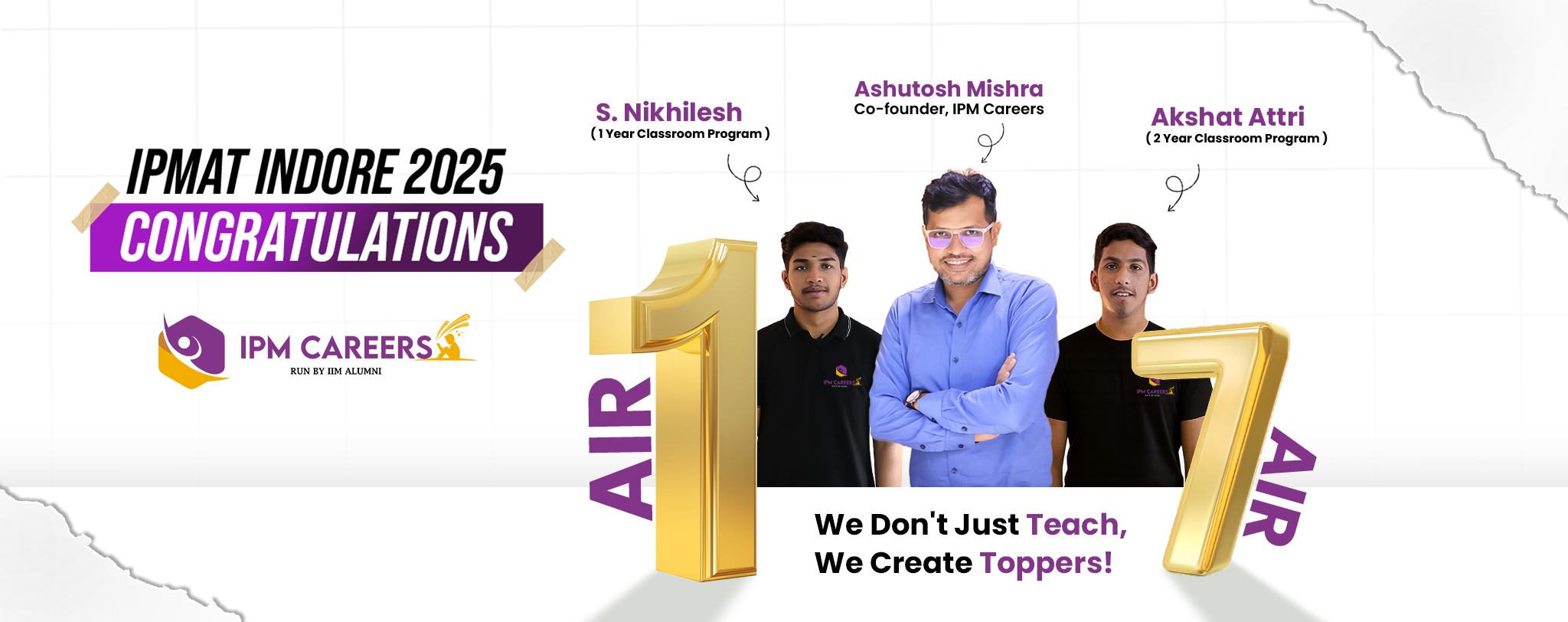
Introduction
Dreaming of cracking IPMAT 2026? In this case, provided you are asking me questions, you must be well aware that the Maths part (Quantitative Ability) is the hardest part of the test to crack. It is not merely the sums that need to be solved but speed, precision and smart manners of doing things. Verbal Ability can easily bring you easy marks, but your performance in QA will determine whether you pass the cut-off or not.
Then how do you fit in the section on Maths? We should work it out step by step.
Exam Structure Overview
You have to be familiar with the outline:
- IPMAT Indore: QA divided into
o 15 Short Answer questions
o 30 MCQs
- IPMAT Rohtak: The questions of QA are 40 (MCQs).
- JIPMAT: QA consists of 33 questions based on the Class 9 th-11 th concepts.
Obviously, Indore is more difficult due to 12 th-level maths and sectional cut-off.
Complete IPMAT Maths Syllabus
Arithmetic Topics
- Percentages, Profit & Loss, Ratio & Proportion, Partnerships
- Averages, Mixture & Alligation, Time & Work
- Time, Speed & Distance, Boats & Streams, Races
Algebra Topics
- Linear & Quadratic Equations, Inequalities
- Logarithms, AP & GP, Binomial Theorem
- Functions & Modulus
Geometry and Mensuration
- Lines, Angles, Triangles, Circles
- Polygons, Coordinate Geometry
- 3D Geometry (surface area & volume)
Higher Mathematics
- Probability, Permutations & Combinations
- Matrices & Determinants
- Trigonometry, Heights & Distances
- Sequence & Series
Number System
- Unit digit, HCF & LCM, Remainder Theorem
- Divisibility rules, Surds & Indices, Factorials
Key Differences: Indore vs Rohtak vs JIPMAT
- Indore: Covers all topics up to Class 12.
- Rohtak: Mostly 10th–11th level maths, very few Class 12 concepts.
- JIPMAT: No Class 12 topics at all.
Topic-Wise Weightage
Here’s a quick look at high-weightage topics:
| Topic | Indore | Rohtak | JIPMAT |
| Arithmetic | High | High | High |
| Algebra | High | Medium | Medium |
| Geometry & Mensuration | Medium | Medium | Medium |
| Higher Mathematics | High | Low | Not Included |
| Number System | Medium | High | High |
Preparation Timeline
Early Foundation Phase (18- 24 months)
- Begin with fundamentals of Arithmetic and Algebra.
- Develop the understanding of basic principles.
Initial Preparation Phase (12-18 months)
- Dedicate 2–3 hours daily.
- Accurately solve topic-level problems with 85 percent.
Mid-Level Preparation Phase (9 12 Months)
- Attempt sectional tests.
- Solve previous year papers.
- Analyze mistakes regularly.
Advanced Phase (6–9 Months)
- Enhance full-length mocks after every 15 days.
- Focus on speed improvement.
Extensive Revision Period (After Board Exams)
- Weekly tests, extensive revision.
- Develop your own formula handbook.
Strategy of each stage of study.
- Foundation: Develop NCERT-level understanding.
- Practice Assignments :Daily problem-solving.
- Sectional Tests :Enhance topic performance.
- Mocks : Learn time management.
- Revision : Shore up weak areas and formulas.
Smart Tricks To Ace QA
- Learn formulae on flashcards or sticky notes.
- Ticks Vedic Maths to be fast.
- Quick questions should be solved first, followed by long questions.
Common Mistakes To Avoid
- Disregarding feeble subjects such as Geometry or Probability.
- Wasting time on a difficult issue.
- Eliminating mocks to the final month.
Resources For IPMAT Maths Prep
- Books:
- NCERT (9th–12th)
- RS Aggarwal (Quantitative Aptitude)
- Arun Sharma (QA for CAT, selective topics)
- Online Platforms:
- Such as IPMCAREERS
- Practice Material:
- PYQs (Previous Year Questions)
- Mock Tests & Sectionals
Practice Plan
- Daily: 20–25 sums from mixed topics
- Weekly: 1 sectional test
- Monthly: 2 full-length mocks
Balance accuracy (85%+) with speed
Comparison With CAT
- CAT QA → More advanced, higher difficulty.
- IPMAT QA → Simpler in theory but trickier because of time pressure + sectional cut-off.
Final 30-Day Strategy
- Solve 1 mock every alternate day.
- Revise formulas daily.
- Focus only on strong + moderate topics (don’t start new ones).
Conclusion
The IPMAT 2026 Maths section is definitely possible to solve. This is achievable by the candidate through methodical preparation, daily practice, and mock analysis. Give your best in the topics of Arithmetic & Algebra, practice PYQs, and having a formula sheet will be of great help for you. Keep in mind that the IPMAT is not a competition of the amount of knowledge, but rather the speed and correctness of your application.
If you really want to get a spot at IIM Indore or IIM Rohtak, you better start early and be consistent with your preparation.
FAQs
- What are the most important topics in IPMAT Maths 2026?
Most of the questions in IPMAT Maths come from Arithmetic and Algebra. After these two, Geometry and Probability have been the most important topics.
- Is the IPMAT Indore QA tougher than Rohtak?
Yes, it is. Because Indore also has Class 12-level maths and Short Answer questions.
- How many hours should I study daily for IPMAT QA?
You should study for 2–3 hours with complete concentration on maths initially and later on with the approaching of the exam, it should be increased to 4 hours.
- Do I need coaching for IPMAT Maths?
Not at all, but taking the help of a coaching has its own advantages in terms of ease in learning through shortcuts, the experience that you get by doing mock tests and getting correct guidance from the expert.
- How can I balance board exams with IPMAT Maths preparation?
You can easily manage it by doing board studies along with 2 hours of daily IPMAT preparation and after your boards keep revising the syllabus you have prepared.
Join Best IPMAT Coaching in India Now
Have a look at our best courses for your IPMAT Preparation.
Checkout our variety of courses for your IPMAT Preps.
Useful Links:

